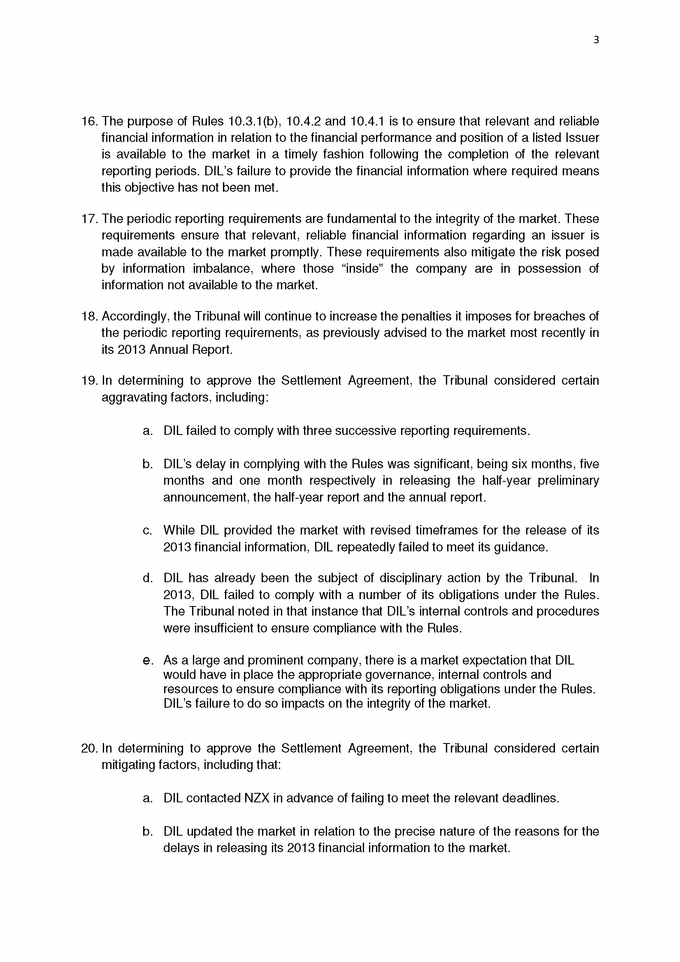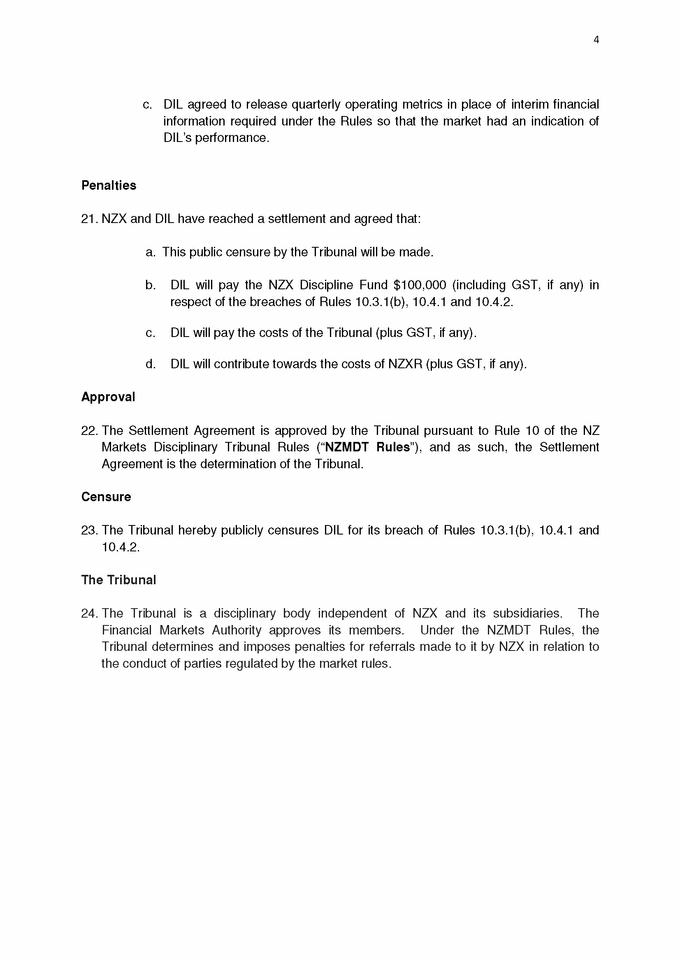Attached files
| file | filename |
|---|---|
| 8-K - 8-K - Diligent Corp | a14-20639_18k.htm |
| EX-10.1 - EX-10.1 - Diligent Corp | a14-20639_1ex10d1.htm |
Exhibit 99.1
|
|
8 September 2014 ANNOUNCEMENT OF NZ MARKETS DISCIPLINARY TRIBUNAL PUBLIC CENSURE OF DILIGENT BOARD MEMBER SERVICES, INC. BY THE NZ MARKETS DISCIPLINARY TRIBUNAL FOR BREACHES OF NZX MAIN BOARD LISTING RULES 10.3.1(b), 10.4.1 and 10.4.2. 1. The NZ Markets Disciplinary Tribunal (“Tribunal”) has approved a settlement agreement between NZX Limited (“NZX”) and Diligent Board Member Services, Inc. (“DIL”) dated 5 September 2014 (“Settlement Agreement”) in respect of breaches by DIL of NZX Main Board Listing Rules (“Rules”) 10.3.1(b), 10.4.1 and 10.4.2. Summary 2. DIL is a Delaware incorporated company governed by US law. It provides online software to compile and archive board materials. 3. DIL is an issuer with its ordinary shares Quoted on the NZX Main Board. DIL is bound by the Rules. 4. DIL has failed to comply with its periodic reporting requirements under the Rules for the 2013 financial year. Background 5. In August 2013, DIL notified NZX and the market that it had identified an error with its revenue recognition practice which required restatement of its financial statements for the fiscal years ending 31 December 2010, 2011, 2012 and the fiscal quarter ended 31 March 2013. The full year financial statements for the years ending 2010, 2011 and 2012 also had to be reaudited. 6. The restatements were required because DIL had incorrectly recognised revenue from new customer agreements and upgrades from the beginning of the month in which an agreement or upgrade was entered into, rather than from the date that the services were made available to the customer and pro-rated based on the number of days in the month for which an upgrade was in effect. The revenue recognition errors and related adjustments did not affect the total revenues ultimately earned or to be earned, the amount or timing of cash received or to be received from individual customer agreements, DIL’s liquidity, or overall cash flow. |
|
|
2 7. DIL was unable to complete its periodic reporting for the 2013 financial year until the restatement and reaudit for the earlier periods had been completed. This meant that DIL could not meet its 2013 periodic reporting obligations under Rules 10.3.1(b), 10.4.1 and 10.4.2 (i.e. in relation to release of a half-year preliminary announcement, an interim report and an annual report). 8. On 30 August 2013, DIL announced that it would not meet the deadlines of 29 August 2013 for its 2013 preliminary half-year report, and 30 September 2013 for its 2013 halfyear report. DIL stated that it expected to release its preliminary half-year report by 28 October 2013 and its half-year report by 29 December 2013. 9. On 17 October 2013, DIL announced that it could not meet its revised deadline for release of its preliminary half-year announcement. DIL advised that it would instead release its preliminary half-year announcement by 12 December 2013. 10. On 4 December 2013, DIL announced that it would not be providing its preliminary halfyear announcement by 12 December 2013, and advised that it would release its preliminary half-year announcement and half-year report on or before 28 February 2014. 11. On 28 February 2014, DIL released its preliminary half-year announcement and half-year report. DIL also released its 2013 full year preliminary announcement on this date. 12. On 18 March 2014, DIL announced that it would not meet its 31 March 2014 deadline for releasing its 2013 annual report. DIL advised that it expected to release its 2013 annual report by 30 April 2014. 13. On 30 April 2014, DIL released its 2013 annual report. 14. The following table demonstrates DIL’s failure to comply with Rule 10.3.1(b), 10.4.2 and 10.4.1: Rule Item Due Provided Delay 10.3.1(b) Preliminary Half-year announcement 29 August 2013 28 February 2014 6 months 10.4.2 Half-year report 30 September 2013 28 February 2014 5 months 10.4.1 Annual report 31 March 2014 30 April 2014 1 month Determination 15. The Tribunal considers DIL’s failure to meet three successive reporting requirements to be very serious. This failure was as a direct consequence of an accounting error made by DIL. The error was significant, effectively taking DIL six months to rectify. During that six month period, investors continued to trade in the securities of DIL without the benefit of all the information they were entitled to have under the Rules. |
|
|
3 16. The purpose of Rules 10.3.1(b), 10.4.2 and 10.4.1 is to ensure that relevant and reliable financial information in relation to the financial performance and position of a listed Issuer is available to the market in a timely fashion following the completion of the relevant reporting periods. DIL’s failure to provide the financial information where required means this objective has not been met. 17. The periodic reporting requirements are fundamental to the integrity of the market. These requirements ensure that relevant, reliable financial information regarding an issuer is made available to the market promptly. These requirements also mitigate the risk posed by information imbalance, where those “inside” the company are in possession of information not available to the market. 18. Accordingly, the Tribunal will continue to increase the penalties it imposes for breaches of the periodic reporting requirements, as previously advised to the market most recently in its 2013 Annual Report. 19. In determining to approve the Settlement Agreement, the Tribunal considered certain aggravating factors, including: a. DIL failed to comply with three successive reporting requirements. b. DIL’s delay in complying with the Rules was significant, being six months, five months and one month respectively in releasing the half-year preliminary announcement, the half-year report and the annual report. c. While DIL provided the market with revised timeframes for the release of its 2013 financial information, DIL repeatedly failed to meet its guidance. d. DIL has already been the subject of disciplinary action by the Tribunal. In 2013, DIL failed to comply with a number of its obligations under the Rules. The Tribunal noted in that instance that DIL’s internal controls and procedures were insufficient to ensure compliance with the Rules. e. As a large and prominent company, there is a market expectation that DIL would have in place the appropriate governance, internal controls and resources to ensure compliance with its reporting obligations under the Rules. DIL’s failure to do so impacts on the integrity of the market. 20. In determining to approve the Settlement Agreement, the Tribunal considered certain mitigating factors, including that: a. DIL contacted NZX in advance of failing to meet the relevant deadlines. b. DIL updated the market in relation to the precise nature of the reasons for the delays in releasing its 2013 financial information to the market. |
|
|
4 c. DIL agreed to release quarterly operating metrics in place of interim financial information required under the Rules so that the market had an indication of DIL’s performance. Penalties 21. NZX and DIL have reached a settlement and agreed that: a. This public censure by the Tribunal will be made. b. DIL will pay the NZX Discipline Fund $100,000 (including GST, if any) in respect of the breaches of Rules 10.3.1(b), 10.4.1 and 10.4.2. c. DIL will pay the costs of the Tribunal (plus GST, if any). d. DIL will contribute towards the costs of NZXR (plus GST, if any). Approval 22. The Settlement Agreement is approved by the Tribunal pursuant to Rule 10 of the NZ Markets Disciplinary Tribunal Rules (“NZMDT Rules”), and as such, the Settlement Agreement is the determination of the Tribunal. Censure 23. The Tribunal hereby publicly censures DIL for its breach of Rules 10.3.1(b), 10.4.1 and 10.4.2. The Tribunal 24. The Tribunal is a disciplinary body independent of NZX and its subsidiaries. The Financial Markets Authority approves its members. Under the NZMDT Rules, the Tribunal determines and imposes penalties for referrals made to it by NZX in relation to the conduct of parties regulated by the market rules. |




